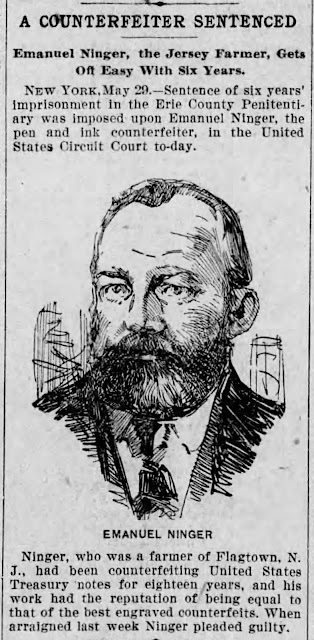By the time Emanuel Ninger's cell door clanged shut in the late Spring of 1896, the Flagtown Forger was already a legend. As early as 1879, his hand painted masterpieces, mostly 20s and 50s, began showing up at banks around the nation. After his arrest - he slipped up by laying a newly minted twenty dollar bill on a damp counter at a New York City bar, causing the ink to run - art critics came forward to hail the German immigrant, not as a Prussin War pensioner as he claimed to be, but as a near-genius of impressionism, and to plea for a short sentence.
Nevertheless, Ninger confessed, was tried quickly, and sentenced to six years at an upstate New York prison.
Most accounts of Ninger's exploits end with his incarceration - but there may be a bit more to the story.
Ninger's wife, Adelaide, vowed to move herself and her children from Flagtown to Buffalo in order to be able to visit her husband in prison and await his eventual release. Nearly penniless - Secret Service agents had confiscated all the cash they found in the home, both counterfeit and genuine - Mrs. Ninger didn't have the means to set up a new household in another state.
Enter Newark brewer, philanthropist, and sometime alderman, George W. Wiedenmayer.
 |
| Newark brewer and philanthropist George W. Wiedenmayer |
Perhaps because of their shared German heritage, his appreciation for fine art, or some other reason lost to time, Wiedenmayer came forward and offered to buy the Ninger house in Flagtown, thereby putting Adelaide in funds for her relocation to Buffalo.
While preparing for the move that summer, Mrs. Ninger and a trusted neighbor decided to search one more time for any cash or valuables possibly hidden by her husband. Although Secret Service agents had searched in every nook and corner, it appears that they overlooked the cellar floor.
Upon prying up the floorboards, the women were astonished to find $5,000 in gold - the news of which quickly spread throughout Flagtown and all of Hillsborough.
A search of US census records reveals the Ninger family, minus Emanuel, living in Buffalo in 1900. It was in July of that year that Ninger, after time off for good behavior, was released. His freedom was brief, however, as he was then tried, sentenced, and served an additional term in a New Jersey prison for manufacturing the funny money.
By 1910, the entire family was reunited and living in Berks County, Pennsylvania, where Ninger described his occupation as "farmer". Curious, since he had done practically no farming at his Flagtown farm, instead claiming he derived his income from a Prussian War pension - a false claim used only as a cover for his counterfeiting operation.
So, what was Ninger doing in Berks County? An interview with Secret Service Special Agent Bruff on the topic of Ninger which appeared in a December 1910 issue of the New York Telegraph provides a clue. Bruff claims that Ninger was so well-respected, after a fashion, by the Secret Service, that he was being paid by the government to no longer be a forger! In essence, he was receiving a retirement check in order to ease the minds of officials at the Treasury Department who had spent nearly two decades and $750,000 trying to apprehend him.
It appears Emanuel Ninger may have gotten his pension after all.








